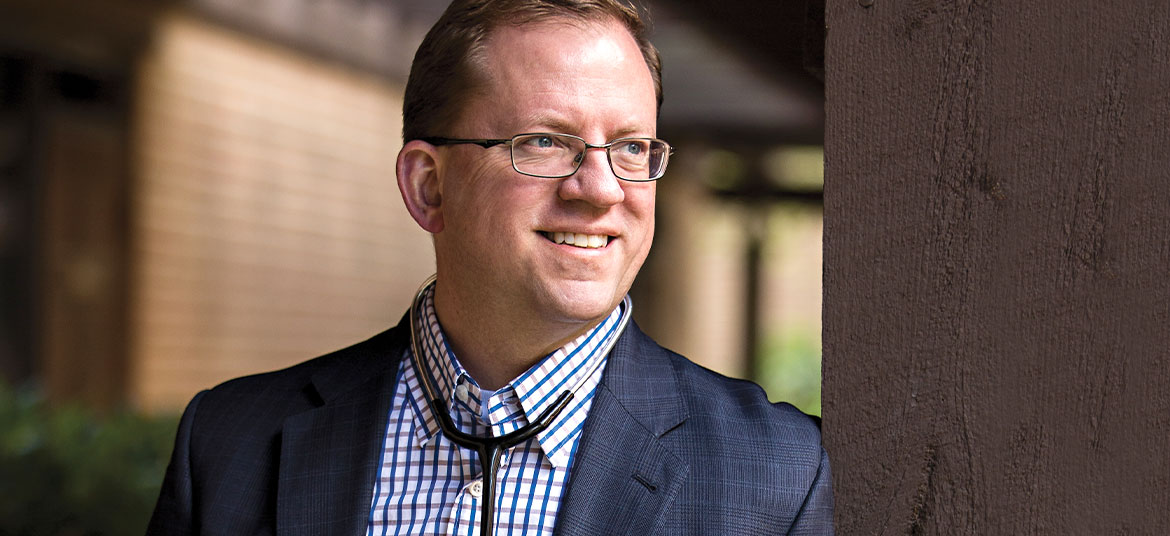
Dr. Benjamin Hippen’s Journey to Transplant Medicine with Fresenius Medical Care
Benjamin Hippen, MD, FASN, FAST, senior vice president, head of transplant medicine and emerging capabilities for Fresenius Medical Care, honestly loves nephrology. “I find clinical care rewarding,” says Dr. Hippen, who worked as a nephrologist for nearly 17 years prior to joining us. Now, he’s leading our efforts to expand access to and understanding of transplant medicine, an important component of our patient-centered mission.
The Road to Nephrology
Dr. Hippen didn’t initially intend to become a doctor, at least not a medical doctor. He graduated from Rice University with an undergraduate degree in philosophy, and he had planned to get a doctorate in that subject. Instead, he found medicine calling him: “I realized that while I loved philosophy, my passion was in healthcare, and in particular, renal care stood out as a unique opportunity for providing long-term continuity of chronic care for patients.”
He went on to earn his Doctor of Medicine from Baylor College of Medicine, then completed his nephrology and transplant training at the University of Alabama at Birmingham. From there, he pursued his career in Charlotte, North Carolina, where he worked both as a transplant and general nephrologist. This is unusual because most physicians focus on either transplant or general practice, but Dr. Hippen’s unique dual focus allowed him to care for patients throughout their journey with chronic kidney disease (CKD).
“I was in the unique position to work with patients at every stage of their disease, from CKD to dialysis to transplant, and to continue that care after they received their transplant,” says Dr. Hippen. “That’s an unusual spectrum of experience for most nephrologists.” This allowed him to form lasting bonds with his patients and truly celebrate their successes through transplant medicine.
Joining Our Global Team
While working as a nephrologist, Dr. Hippen contributed to more than 50 peer-reviewed manuscripts focused on ethics and public policy issues in nephrology and transplantation. Dr. Frank Maddux, global chief medical officer for Fresenius Medical Care, read and responded to a paper Dr. Hippen wrote titled “Integrating Kidney Transplantation Into Value Based Care for People With Renal Failure.” The two began to collaborate, authoring an article on the evolution of the transplant waiting list.
Through that relationship, Dr. Hippen began consulting with Fresenius Medical Care and collaborating with the nascent Fresenius Medical Care Foundation, which aims to raise awareness of transplantation and provide support for people living with kidney disease.
Eventually, Dr. Hippen decided to leave clinical practice and join our team in August 2021. It was a bittersweet decision as he loved working with patients and having a direct impact on their well-being, but he saw the possibility of helping more people with renal disease through his work at Fresenius Medical Care.
“I was especially attracted to the idea that I would be joining a Global Medical Office in hopes that I would be able to bring transplant-related initiatives to patients outside of the United States as well,” explains Dr. Hippen.
Inspiring Progressive Patient Care
In Dr. Hippen’s current leadership role with Fresenius Medical Care, he is at the helm of working to create solutions that aid patients in getting onto transplant waiting lists while also helping them overcome barriers to accessing the highest levels of care. He notes that many factors can contribute to health inequities, such as experiencing homelessness, living in rural areas, or other social factors that can limit access to kidney transplantation for dialysis patients with end stage renal disease.
“We need to become more creative in addressing those barriers,” he says. “Whatever solutions we come up with, it has to be in service to the patients and what they want, and that's going to change patient to patient over time.”
Dr. Hippen has ambitious goals for his role and is eager to work toward finding solutions for people with renal disease. “I think improving access is just a piece of our goal at Fresenius Medical Care to try and be deeply involved in every aspect of patient care,” he says. “We are looking at the long-term journey for patients and need to understand that journey doesn’t just transpire over years, but over decades. The way to help patients is to address their needs throughout their experience of kidney disease. I’m excited to get started.”
If you’d like to join Dr. Hippen and our team to make a difference in the lives of people living with kidney disease, visit jobs.fmcna.com.


